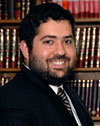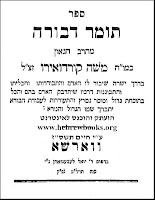I just read the article below (posted with permission from the author) by Rabbi Shafran about Reb Yosef, author of THE UNIVERSAL JEW, entering the Olam HaEmes. I am stunned. His sefer is a favorite of mine and I constantly find myself picking it up (after hearing about the sefer from R Gershon Seif years ago).
A MODERN-DAY PATRIARCH
Rabbi Avi Shafran
The first notice, shortly before Rosh Hashana, came from “Tehilla.” The subject box of the e-mail read: “Baruch Dayan HaEmet/URGENT, YOSEF PASSED AWAY!” and the message began: “I can’t believe this rabbi. I can’t believe he has left us. He was so concerned for me and my family….”
Tehilla is not her real name. She is a non-Jewish resident of a Muslim country, and is married to a Hindu man. But she is a “Noahide,” a person who has accepted the Torah’s universal “Seven Commandments” for humankind. In fact, she studies the works of, among others, the Chofetz Chaim, and pines for the day for when her adult sons, who are following in her path, will find wives ready to do the same. And for Moshiach’s arrival.
Yosef was Yosef ben Shlomo Hakohen, an American-born Jewish returnee to Judaism (his original family name was Oboler) who lived in Bayit Vegan, Jerusalem, and who made it his life’s work to bring Jews closer to their heritage and to be a source of encouragement and direction to non-Jews who have found their way to realizing the Torah’s truth.
And so the anguish at Yosef’s unexpected passing was felt not only by Tehilla but by countless people around the world, in the strangest of places, who had benefitted from his writing—and, in many cases, his personal interaction with them.
I never had the honor of meeting Yosef in person but knew him from numerous electronic conversations we had. He was a remarkable man. In fact, I had begun asking him about his background and work, hoping one day to make him the subject of an Ami interview. Now, sadly, I can share only the few facts I came to garner; and, incomparably sadder still, not in an interview but an obituary.
Yosef, the child of leftist social activists, discovered Torah in his youth and was captivated by a deep desire to reach out to Jews who shared his parents’ convictions, to help them better understand the true raison d’etre of the Jewish nation. “I wanted,” he wrote me, “to help them to understand that it is through the study and fulfillment of the Torah that we make our contribution towards a better world.”
In 1995, Feldheim published Yosef’s “The Universal Jew: Letters To a Progressive Father From His Orthodox Son,” telling the tale of his parents’ dedication to the poor and underprivileged, and about his own personal journey, which led him to dedicate his own life to outreach. The following year, in a Jewish Observer article entitled “And He shall turn the Hearts of the Fathers to the Sons,” Yosef reprised some of that story. And he established “Hazon—Renewing Our Universal Vision,” a study program/Internet resource that touched untold numbers of hearts and minds.
In one of his many communications to his followers, Yosef quoted Rav Avrohom Yoffen, zt”l, the Rosh Yeshiva of Bais Yosef-Novardok, as noting the significance of the fact that our forefather Avrohom is the archetype of both kindness toward others and intolerance for idolatry. The latter, he explains, is based on a belief that various forces in nature are in competition with one another. That antagonism, he continued, is paralleled in, and connected to, human beings’ alienation from one another. Avrohom Avinu embraced lovingkindness to counter that disaffection, and he fought idolatry to undermine its root cause.
That well describes Yosef’s life-mission itself.
On Yom Kippur, “Tehilla” lit a yahrzeit candle for Yosef, who left no blood-relatives.
I remember how she expressed her feelings about meeting and corresponding with Yosef and other Jews who have offered her encouragement and guidance. “With all the sufferings [the world has] inflicted on you all,” she once wrote, “I still cannot fathom how magnanimous you all are in being a light to all nations.
“After meeting your people [by e-mail], I cannot understand how such a warm, compassionate and humane people can be so persecuted and so misunderstood.
“All I can pray is when Hashem decides it’s time for all your sufferings to be over, He will show us Gentiles the compassion we failed to show you all.”
“Soon G-d is going to say ‘enough’ to your tears…”
And to hers as well, may the day come soon.
© 2011 AMI MAGAZINE
[Rabbi Shafran is an editor at large and columnist for Ami Magazine]
The above essay may be reproduced or republished, with the above copyright appended.
Communications: rabbishafran@amimagazine.org
To receive essays like the one above when they first appear, as well as other columns I write, like”Gleanings” (a synopsis of some unusual media articles from the previous week with poignant comments appended) and “News and Analysis” (a detailed treatment of a recent news story) – not to mention a wealth of other interesting reading – subscribe to Ami at http://amimagazine.org/subscribe.html .
 On Monday, I finished listening to an amazing shiur from Rabbi Michael Skobac, the Director of Education and Counselling for Jews for Judaism (Canada). The shiur, titled “THE FOREST BEYOND THE TREES: What is Judaism’s Bottom Line?” is available for streaming or downloading here.
On Monday, I finished listening to an amazing shiur from Rabbi Michael Skobac, the Director of Education and Counselling for Jews for Judaism (Canada). The shiur, titled “THE FOREST BEYOND THE TREES: What is Judaism’s Bottom Line?” is available for streaming or downloading here.






